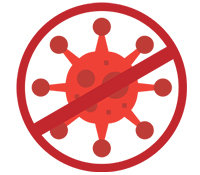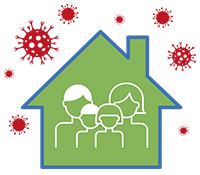FAQ: Translating Health Science and Accessing Services
When it comes to health, everyone wants reliable, up to date information. On this page, we will report on the latest scientific evidence to answer questions you might have that are important to you and the community. We will also provide answers to practical questions like where to access resources in Lincoln County.
Frequently Asked Questions
How does contact tracing work?
Answer: Please see this brief video detailing the contact tracing process for Lincoln County.
Updated April 17, 2021
How do I get on the list to get vaccinated for COVID-19?
Answer: Please see a brief video from Lincoln County Public Health Manager Jennifer McCully.
Montana is currently in phase 1B+ and will transition to phase 1C on April 1. Phase 1B includes person 60 and over and those with certain medical conditions not included in the orginal plan 1B (see below for original 1B qualifying medical conditions). On April 1, all Montanans 16 and older will be eligible for the COVID-19 vaccine.
1. Cancer
2. Chronic kidney disease
3. COPD (chronic obstructive pulmonary disease)
4. Down Syndrome
5. Heart conditions, such as heart failure, coronary artery
disease, or cardiomyopathies
6. Immunocompromised state (weakened immune system)
from solid organ transplant
7. Severe Obesity (BMI ≥ 40 kg/m2)
8. Sickle cell disease
9. Type 1 & 2 Diabetes mellitus
10. On a case by case basis, medical providers may include
individuals with other conditions that place them at
elevated risk for COVID-19 related complications
Updated March 26, 2021
Are Covid-19 vaccines safe?
Answer: Covid-19 vaccines are safe and effective. The CDC continues to conduct safety monitoring and so far, only mild side effects such as pain and swelling at the injection site, headaches, chills or fever have been reported. An extremely rare number of people have had severe allergic reactions (for instance 21 cases were reported in the first roughly 2 million Pfizer vaccinations). That is why, when severe allergic reactions do happen, most (71 %) happen within the first 15 minutes and medical providers can give you medicines that will effectively and immediately treat the reaction.
Source: https://www.cdc.gov/coronavirus/2019-ncov/vaccines/safety.html
Updated February 10, 2021
Please see a brief message from Dr. Kelli Jarett on getting her vaccine
New strains of the COVID-19 virus have been detected. Do the new strains cause more serious illness and likelihood of death?
Answer: Viruses constantly change through mutation and this is expected over time. Multiple variants of the COVID-19 virus have been detected in the US. Yes, it appears that the variant from the UK, South Africa and Brazil spread more easily and quickly. An increase in the number of cases will put more strain on health care resources, lead to more hospitalizations, and potentially more deaths. Experts in the UK have reported that their variant may be associated with increased risk of death compared to other variants. Studies are currently underway to confirm this as well as the findings from early studies showing that current vaccinations are effective against these variants.
Source: CDC Website: https://www.cdc.gov/coronavirus/2019-ncov/transmission/variant.html
Updated February 10, 2021
Please see a brief message from the Lincoln County Health Officer on variants:
Once I get vaccinated, can go back to my “normal” pre-COVID lifestyle?
Answer: Even after vaccination, it will still be important for people to wear masks, maintain social distance, and wash hands until a large enough percentage of the population have gotten the vaccine or until COVID stops spreading. No vaccine is 100 % effective and we do not know yet if the vaccines prevent transmission, so it might be possible to still spread it to others even if you have been vaccinated.
https://www.cdc.gov/coronavirus/2019-ncov/transmission/variant.html
Updated February 10, 2021
Please see a brief message from Dr. Brad Black, Lincoln County Health Officer:
What are the long-term effects of COVID-19?
Answer: Scientists are still gathering information on the long-term effects of COVID-19 so there is not any definitive answer yet. One international survey of 3,762 people who had experienced illness from COVID-19 for at least 28 days, asked them to identify long-term effects (effects that were still with them 6 months later). Though this survey is still undergoing “peer-review” (a process where medical experts evaluate the methods and findings), the initial reports are worth reviewing. Among the findings:
- The most common symptoms reported by people were fatigue (98.3 %), issues related to brain functioning (including difficulty concentrating, thinking, planning, decision-making, memory loss), and breathing issues (93 %).
- Other common symptoms included difficulty with sleep (78 %), numbness/tingling sensations (80.5 %), headaches (77 %), and cardiovascular issues (86 %) like heart palpitations, fast heart rate (also known as tachycardia), and burning in the chest.
- Most people (68.9 %) reported not been able to return to work at the levels prior to becoming ill even 6 months afterward.
- Overall, people reported more than 200 lingering effects from COVID-19
Source: https://www.medrxiv.org/content/10.1101/2020.12.24.20248802v2
Updated: February 10, 2021
Please see a brief message from the Lincoln County Health Officer on the long term effects:
My friend is saying some stuff about COVID-19 that sounds hard to believe. How can I find out whether this stuff is true?
Answer: As has been seen since the start of the pandemic, misinformation, disinformation, and conspiracy theories continue growing out of control. No doubt there will be plenty of bad information floating about on Covid-19 vaccines, and indeed, plenty is already out there. (No, there is no microchip tracker in the vaccine, it does not contain fetal cells, and it will not give you Covid.) Places to go for accurate information include the CDC (which already has a FAQ about Covid vaccines), the FDA, major hospital websites such as Children’s Hospital of Philadelphia’s Vaccine Education Center.
It’s also helpful to begin regularly practicing a technique called SIFT, coined by Mike Caulfield at Washington State University. When you come across a piece of new information and you’re not sure if it’s true:
- Stop
- Investigate the source
- Find better/other coverage in other news sources
- Trace claims, quotes, and media to their source
Source: Tara Haelle, Science journalist. https://elemental.medium.com/every-covid-19-vaccine-question-youll-ever-have-answered-9a0eeb334ded
Updated: January 5th, 2021.




